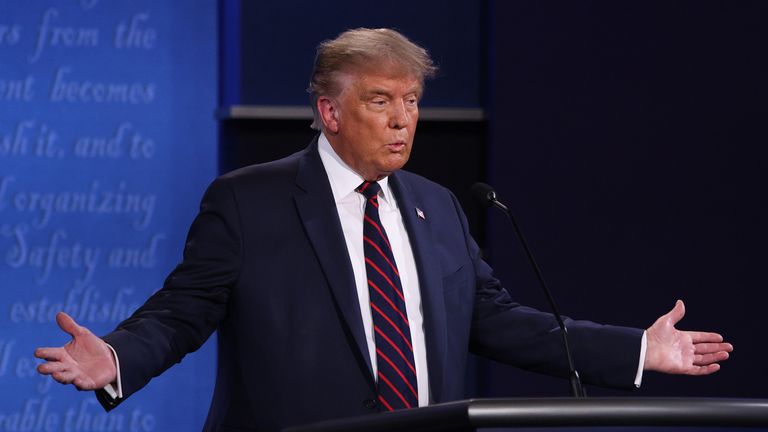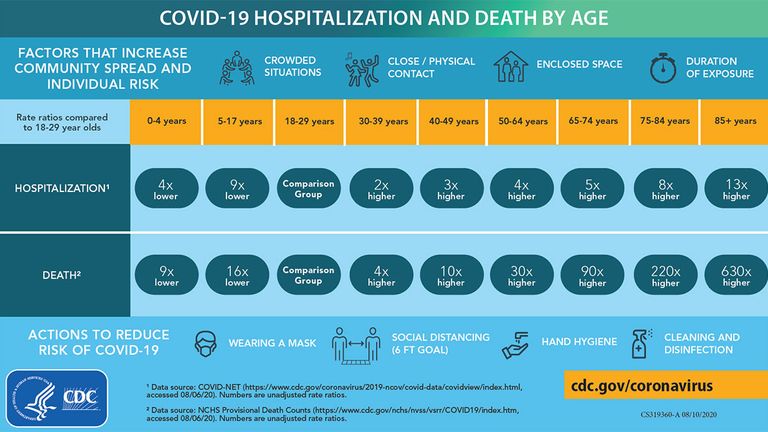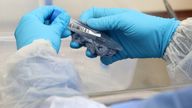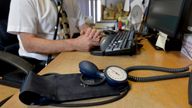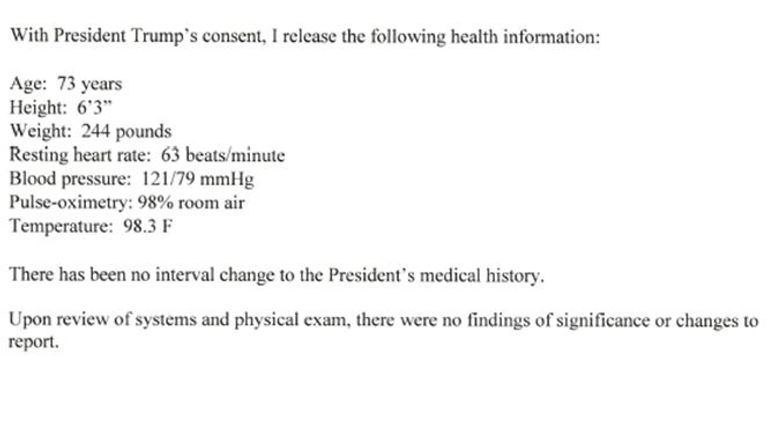Trump coronavirus: Why president's age and physical condition put him at 'highest risk' from COVID-19
Based on his age and his most recent physical tests, the president is considered to be at higher risk of serious complications.
Friday 2 October 2020 16:00, UK
Donald Trump's positive test result for coronavirus has immediately prompted speculation around his chances of suffering severe illness from the disease.
Based on his age and the results of his most recent physical tests, the 74-year-old president is considered to be at higher risk of serious complications from a virus that has now killed more than 200,000 people across the US.
According to statistics published by the US government's Centers for Disease Control and Prevention (CDC), people in the 65 to 74 age bracket are five times more likely to need hospital treatment than an 18 to 29-year-old - and 90 times more likely to die.
Live updates on coronavirus from US, UK and around world
The first detailed studies into the mortality risk for COVID-19 suggested that for every 1,000 people in their mid-seventies or older who are infected, around 116 will die.
Eight out of 10 people in the US who have died during the pandemic are over 65.
But while advanced age has been strongly linked to a person's chances of getting seriously ill after contracting coronavirus, other health factors are also understood to be important.
Health records for Mr Trump released in June showed his weight was 17st 6lbs.
Based on his 6ft 3ins frame, that gave him a Body Mass Index of 30.5 which means he is categorised as obese - along with around 40% of Americans.
The CDC says having obesity - defined as a body mass index (BMI) of 30 or above - increases a person's risk of severe illness from COVID-19.
And a study released in August found 77% of 16,780 people who needed to go into hospital for coronavirus treatment were overweight or obese.
Anne Dixon, a physician-scientist who studies obesity and lung disease at the University of Vermont, said experts did not initially recognise how big a risk factor the condition was.
"It's not until more recently that we've realised the devastating impact of obesity, particularly in younger people," she told Science magazine in September.
She added that this "may be one reason for the devastating impact of COVID-19 in the United States".
The president's physical tests have shown he has a resting heart rate of 63 beats per minute.
A normal resting heart rate for adults ranges from 60 to 100 beats per minute, and a lower rate normally implies better cardiovascular fitness. This will reduce the risks from coronavirus.
His blood pressure in the last publicly revealed tests came in at 121 over 79.
According to the American Heart Association, elevated blood pressure range is when a reading for the upper number consistently ranges from 120 to 129 and less than 80 for the lower number.
People with elevated blood pressure are likely to develop high blood pressure unless steps are taken to control the condition.
While evidence is mixed, the British Heart Foundation says research has indicated that there is a link between high blood pressure and severe illness or death from coronavirus.
The New York Times reported in September this year "a coronary calcium CT scan in 2018 recorded a score of 133 meaning that he has a form of heart disease common to men in their 70s".
The same article also said the president had strongly denied that "he had mini strokes last year around the time of a mysterious trip to the hospital".
Mr Trump explained the trip by saying it was part of his yearly physical check up.
Dr Aseem Malhotra, a senior cardiologist and expert on the risks posed by obesity, thinks "it is likely that Donald Trump has metabolic syndrome which puts him at the highest risk of death or hospital admission from the virus".
Dr Malhotra said the president faced "a three-fold risk of death and five-fold risk of hospitalisation. More than Boris Johnson."
However, Mr Trump has shown marked improvement in his cholesterol levels during his presidency, helped by medication.
